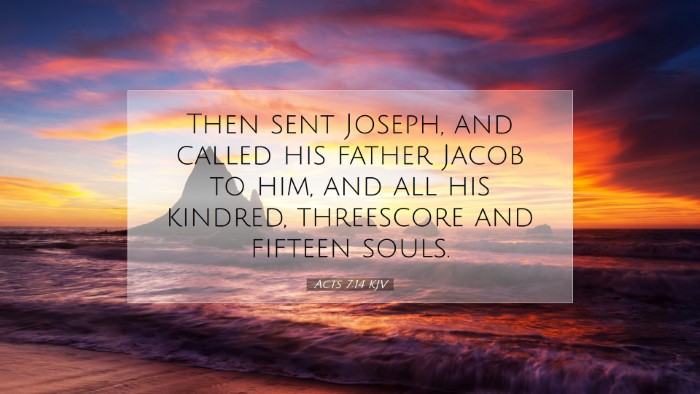Text of Acts 7:14: "Then sent Joseph, and called his father to him, and all his kindred, threescore and fifteen souls." (KJV)
Contextual Overview
This verse is situated within Stephen's speech before the Sanhedrin, where he recounts the history of Israel. Stephen's reference to Joseph calling for his family signifies a pivotal moment in the narrative of the Israelites in Egypt and sets the stage for their eventual exodus and deliverance.
Insights from Public Domain Commentaries
Matthew Henry's Commentary
Matthew Henry notes the significance of Joseph in the context of God's providence. He emphasizes that Joseph, although sold into slavery, rises to prominence in Egypt, reflecting how God can turn unfortunate circumstances into a means of blessing.
Henry elucidates the term "threescore and fifteen souls" as he connects it to the lineage of Jacob. He mentions that this number signifies the total of Jacob's descendants who entered Egypt, underscoring the fulfillment of God's promise to Abraham that his descendants would multiply.
Albert Barnes' Notes
Albert Barnes highlights the theological implications of this verse as it pertains to God's plan for the Israelites. He points out that the migration of Jacob's family to Egypt serves as an essential turning point leading to the Israelites' oppression and eventual deliverance through Moses.
Barnes also contrasts the number mentioned—seventy-five, as derived from the Greek Septuagint—with what is traditionally counted (seventy), suggesting a deeper reflection on the growth and blessings of Jacob's progeny, and reaffirms that Joseph's actions led to the Israelites' preservation during the famine.
Adam Clarke's Commentary
Adam Clarke delves into the social and familial dynamics involved in Joseph's call to his family. He notes how Joseph's status as viceroy of Egypt was pivotal in ensuring the survival of the Israelite nation during severe famine.
Clarke also discusses the importance of the familial bond represented in this gathering and how it speaks to the cohesiveness of the nation of Israel. The migration to Egypt is portrayed as both a moment of necessity and divine orchestration, leading to a complex relationship with Egypt that would later culminate in their slavery.
Theological Reflections
This verse encapsulates the themes of divine providence, familial unity, and the unfolding of God's redemptive plan. Joseph's actions illustrate how God often works through individual lives to accomplish His larger purposes. The gathering of Jacob's family can be viewed as a precursor to the identity of Israel as a chosen nation destined for deliverance.
The contrast between Joseph's elevated status and the eventual plight of his descendants highlights the ironic twist within history where blessings can turn into trials, reflecting the cyclical nature of God's dealings with humanity.
Conclusion
Acts 7:14 serves as a crucial verse in the biblical narrative, encapsulating the faithfulness of God through the story of Joseph and his family. The insights gained from various commentaries reveal the depth of God's providential care and the significance of familial bonds as foundational elements of the Israelite identity. As students, pastors, and scholars meditate on this verse, they are called to reflect on God's past faithfulness and anticipate His redemptive work in the future.


